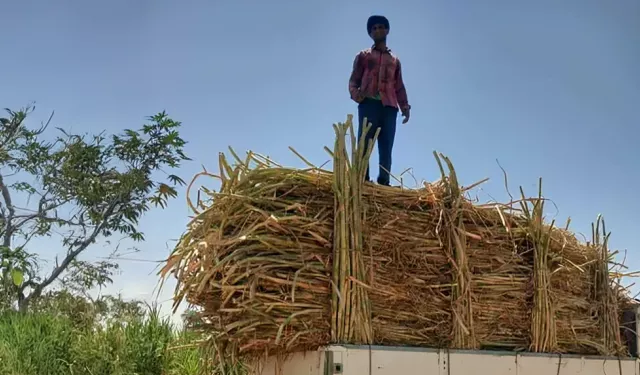Farmers from the Upper Egyptian governorates of Qena and Aswan are demanding long-overdue dues from sugar factories, even as workers across several plants under the Egyptian Sugar and Integrated Industries Company (ESIIC) enter the third week of coordinated strikes and protests.
The twin grievances—of those who cultivate and those who process Egypt’s sugarcane harvest—have laid bare the fractures in the country’s agro-industrial economy, where delayed wages and withheld payments are testing the endurance of laborers in the fields and on the factory floor alike.
Worker protests began two weeks ago at the Edfu and Kom Ombo factories in Aswan and spread quickly. By last week, industrial action hit the Armant factory in Luxor, the Deshna plant in Qena, and the machinery works at the Hawamdeya Sugar Complex in Giza.
According to a factory worker at Hawamdeya who spoke to Al Manassa, workers at Armant and Hawamdeya ended their strike on Sunday after threats of termination and reports that National Security had been notified. The worker, requesting anonymity, said the pressure campaign from management forced some to return to work.
Farmers under strain
Mohamed Mahdi, a sugarcane farmer in Wadi Al-Naqra near Nasr Al-Nuba in Aswan, said the past season was marked by extreme hardship. Farmers lost thousands of feddans due to collapsing irrigation stations that left their lands dry.
“Still, we pushed through, thinking the crop would help us recover losses. But that didn’t happen,” Mahdi said. He accused the Kom Ombo factory administration of worsening their plight by deducting between half a ton to a full ton per shipment under the pretext of “impurities.”
Each ton costs the farmer around 300 Egyptian pounds to transport, while the company pays only 100 pounds in allowances, Mahdi explained. “We delivered our last batch in early March and received only a partial payment. Ten percent—what they call ‘clearing’—was supposed to be paid in June. But they delayed it, along with 100 pounds in transport dues for every ton.”
Mahdi says he is owed 225,000 pounds by the Kom Ombo factory, which he had planned to use to pay off land he purchased through a government reclamation company. “Now the company is taking the check to the public prosecutor because the payment deadline passed.”
His brother Mahmoud, also a farmer in Wadi Al-Naqra, told Al Manassa they have not been able to prepare their land for the next season. Their plot receives no subsidized fertilizers, forcing them to buy at black-market rates.
Shared plight in the south
In Qus, Qena Governorate, cane growers reported that the 10% “clearing” payment has yet to be disbursed. In Luxor, farmers said the Armant plant is also withholding dues.
“I can’t pay back my agricultural loan,” said Ahmed Ali, a cane farmer in Luxor. “I owe the Agricultural Bank 200,000 pounds. The Armant factory owes me more than 300,000 pounds. They have my money, and now the bank is chasing me.”
In Nag Hammadi, also in Qena, farmers on reform land said their debts to the local factory have reached 40% of the total crop value delivered four months ago.
Delayed government funds
A source at the Ministry of Supply, speaking to Al Manassa on condition of anonymity, confirmed that 3 billion pounds in farmer payments remain unpaid out of a total of 14 billion pounds owed. The delay, the source explained, stems from the Ministry of Finance’s failure to release the funds.
Negotiations between the supply and finance ministries are ongoing, the source added, with efforts focused on securing funds for payment by the end of the fiscal year in July, a deadline that has already passed.
According to the Ministry of Supply, the 2024–2025 season aimed to purchase around 6 million tons of sugarcane to produce 650,000 tons of sugar. The government ultimately collected 5.476 million tons from eight factories, including Kom Ombo and Edfu in Aswan, Armant in Luxor, and Abu Qurqas in Minya.
Mustafa Abdel-Gawad, head of the Sugar Crops Council, told Al Manassa that the shortage of liquidity at ESIIC is the main reason for the delay. “The Kom Ombo, Qus, and Nag Hammadi factories are all affected, yet payments will likely come in stages, once financial allocations are secured,” he said.
But farmers from Qena, Luxor, and Aswan are losing patience. They told Al Manassa that the company’s practices, including delayed payments, arbitrary deductions for “impurities,” and refusal to cover transportation costs, amount to theft of their labor.
“With all these issues,” one farmer said, “many of us are thinking about abandoning sugarcane altogether next season.”
